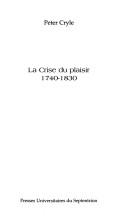| Listing 1 - 2 of 2 |
Sort by
|
Book
ISBN: 3319894250 9783319894256 3319894269 Year: 2018 Publisher: Cham : Palgrave Macmillan,
Abstract | Keywords | Export | Availability | Bookmark
 Loading...
Loading...Choose an application
- Reference Manager
- EndNote
- RefWorks (Direct export to RefWorks)
This book explores the political ideas of the Belgian Revolution of 1830, which led to the break-up of the Restoration state of the ‘united’ Kingdom of the Netherlands. It uncovers the origins of liberalism and political Catholicism in the Southern Netherlands in the wake of the French Revolution, and traces the development of political language in the context of the tensions between the Northern and Southern part of the united Netherlands. It shows how differences in ‘Dutch’ and ‘Belgian’ political and intellectual history resulted in different understandings of essential political concepts such as ‘sovereignty’ and ‘balance of powers’, as well as of the nature of the constitutional order of 1815. Finally, it traces the emergence of Belgian nationalism within the discourse of opposition against the government. Stefaan Marteel therefore provides a fresh perspective on the intellectual background of the rise of the nation-state in the nineteenth century.
National characteristics, Belgian. --- Belgium --- Netherlands --- Politics and government --- History --- Belgian national characteristics --- Europe-History-1492-. --- World politics. --- Great Britain-History. --- Intellectual life-History. --- History, Modern. --- History of Modern Europe. --- Political History. --- History of Britain and Ireland. --- Intellectual Studies. --- Modern History. --- Modern history --- World history, Modern --- World history --- Colonialism --- Global politics --- International politics --- Political history --- Political science --- Eastern question --- Geopolitics --- International organization --- International relations --- Europe—History—1492-. --- Great Britain—History. --- Intellectual life—History. --- Politique et gouvernement --- Caractère national belge. --- Belgique --- 943 Vlaamse en Belgische geschiedenis 1830-1914 --- Caractère national belge.

ISBN: 2859397922 9782859397920 2757426761 Year: 2020 Volume: 838 Publisher: Villeneuve d'Ascq : Presses universitaires du Septentrion,
Abstract | Keywords | Export | Availability | Bookmark
 Loading...
Loading...Choose an application
- Reference Manager
- EndNote
- RefWorks (Direct export to RefWorks)
La fin du dix-neuvième siècle nous a appris une vérité douteuse : que la sexualité humaine est universelle. Depuis cette époque, nous nous sommes habitués à la singularité du plaisir, dans son principe toujours le même. Mais au dix-huitième siècle, on préférait parler de plaisirs au pluriel, et de l’art de les varier. Comment, dans les textes libertins et pornographiques, ce pluriel s’est-il transformé en singulier ? Cette transformation, historiquement, suppose une véritable crise.
French literature --- Erotic literature, French --- Pleasure in literature. --- Sex in literature. --- Sex customs. --- Sexual ethics. --- Sex in popular culture. --- Littérature française --- Littérature érotique française --- Plaisir dans la littérature --- Sexualité dans la littérature --- Vie sexuelle --- Morale sexuelle --- Sexualité dans la culture populaire --- History and criticism. --- Histoire et critique --- Sex customs --- Libertinism --- Dissenters --- Libertinism in literature. --- Sex in literature --- History --- Europe --- Intellectual life --- Moral conditions --- Littérature française --- Littérature érotique française --- Plaisir dans la littérature --- Sexualité dans la littérature --- Sexualité dans la culture populaire --- Sex customs - Europe - History - 18th century. --- Libertinism - Europe - History - 18th century. --- Dissenters - Europe - History - 18th century. --- Europe - Intellectual life - History - 18th century. --- Europe - Moral conditions - History - 18th century. --- Literature (General) --- romantisme --- littérature --- plaisir --- crise
| Listing 1 - 2 of 2 |
Sort by
|

 Search
Search Feedback
Feedback About UniCat
About UniCat  Help
Help News
News